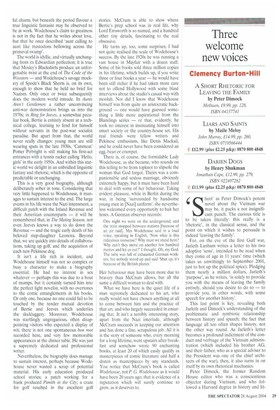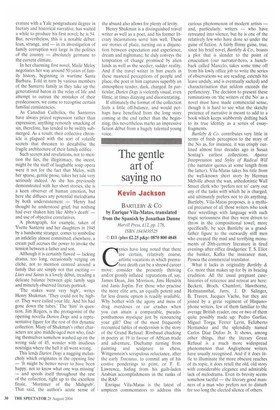Three welcome new voices
Clemency Burton-Hill
A SHORT RHETORIC FOR LEAVING THE FAMILY by Peter Dimock Methuen, 0.99, pp. 128, ISBN 04137741 LIARS AND SAINTS by Maile Meloy John Murray, £14.99, pp. 260, ISBN 0719566444 it £12.99 (plus £2.25 p&p) 0870 800 4848 DARIEN DOGS by Henry Shukman Jonathan Cape, £12.99, pp. 279. ISBN 022407282 (t) £11.99 (plus £2.25 p&p) 0870 800 4848
hort' as Peter Dimock's potent novel about the Vietnam war may be, it packs a not insignificant punch. The curious title is to be taken literally: this really is a 'rhetoric', in the classical sense, and the point on which it wishes to persuade is indeed 'leaving the family'. For, on the eve of the first Gulf war, Jarleth Lanham writes a letter to his two adoptive 'sons', intended to be read when they come of age in 11 years' time (which takes us unwittingly to September 2001, just to hot up the political spice). Pledging them nearly a million dollars, Jarleth's 'purpose', as he writes, 'is solely to provide you with the means of leaving the family entirely, should you desire to do so — to provide you, in other words, with some speech for another history'. This last point is key, revealing both Jarleth and Dimock's understanding of the problematic and symbiotic relationship between history and speech; the fact that language all too often shapes history, not the other way round. As Jarleth's letter becomes a profound indictment of the conduct and verbiage of the Vietnam administration (which included his brother AG, and their father, who as a special adviser to the President was one of the chief architects of the war), then, it also turns in on itself by its own rhetorical mechanics. Peter Dimock, the former Random House editor who was a conscientious objector during Vietnam, and who followed a Harvard degree in history and lit erature with a Yale postgraduate degree in literary and historical narrative, has waited a while to produce his first novel; he is 54. But, nevertheless, this is a notable debut: lean, strange, and — in its investigation of family corruption writ large in the politics of the country — absolutely germane to the current climate.
In her charming first novel, Maile Meloy negotiates her way around 50 years of family history, beginning in wartime Santa Barbara. Told in turn by various members of the Santerre family as they take up the generational baton in the relay of life and attempt to outrun the mistakes of their predecessors, we come to recognise certain familial consistencies.
As Canadian Catholics, the Santerres have always prized repression rather than expression; anything remotely smacking of sin, therefore, has tended to be swiftly submerged. As a result, their collective chronicle is plagued with the sort of volatile secrets that threaten to destabilise the fragile architecture of their family edifice.
Such secrets and revelations, not to mention the lies, the illegitimacy, the incest, might be the stuff of laughable soap opera were it not for the fact that Meloy, with her sparse, gentle prose, takes her tale very seriously indeed. As she has previously demonstrated with her short stories, she is a keen observer of human emotion, but here she diffuses any potential melodrama by both understatement — 'Henry had thought he understood grief, but nothing had ever shaken him like Abby's death' — and use of objective correlatives.
A photograph, for example, taken of Yvette Santerre and her daughters in 1945 by a handsome stranger, comes to symbolise an infidelity almost committed; elsewhere, a cream puff accrues the power to invoke the tension between a father and son.
Although it is certainly flawed — lacking drama, too long, occasionally verging on cliché, not to mention centred around a family that are simply not that exciting — Liars and Saints is a lovely debut, treading a delicate balance between epic family saga and minutely observed literary portrait.
The stakes were very high', writes Henry Shukman. 'They could not be higher. They were called your life. And his had gone down the tubes.' The 'him' in question, Jim Rogers, is the protagonist of the opening novella Darien Dogs and a representative figure for the rest of this dynamic collection. Many of Shukman's other characters are also middle-aged men who, finding themselves somehow washed up on the wrong side of 45, wonder with insidious nostalgia where the hell it all went wrong.
This lends Darien Dogs a nagging melancholy which originates in the opening line
— 'It might be better never to have been happy, not to know what one was missing' — and spools itself throughout the rest of the collection, right up to the excellent finale, 'Mortimer of the Mahgreb'. That said, the author's acute sense of the absurd also allows for plenty of levity.
Henry Shukman is a distinguished travel writer as well as a poet, and his former literary incarnations serve him well. These are stories of place, turning on a disjunction between expectation and experience, dream and nightmare; he duly conveys the temptation of change promised by alien lands as well as the seedier, sadder reality. And if the travel writer in him excels in these nuanced perceptions of people and place, the poet in him captures superbly an atmosphere tender, dark, charged. In particular, Darien Dogs is violently visual, even filmic, at times dizzying and disorientating.
If ultimately the format of the collection feels a little off-balance, and would perhaps have benefited from the long story coming at the end rather than the beginning, this nevertheless marks an impressive fiction debut from a hugely talented young voice.



























































 Previous page
Previous page